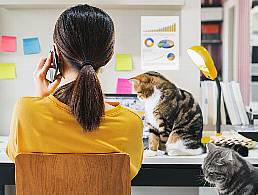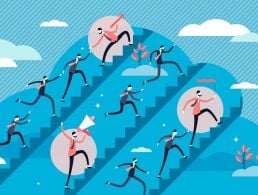Even if you don’t feel productive right now, burnout is more likely than ever. Resilience coach Siobhán Murray talks about why that is and how to avoid it.
There are a lot of misconceptions around burnout. For starters, it can often be used flippantly, almost like a buzzword for a deeper-than-normal level of tiredness. In fact, it wasn’t until 2019 that the World Health Organization recognised and defined burnout, labelling it an ‘occupational phenomenon’.
However, even that label can cause confusion, primarily driving the misconception that burnout is solely related to work and, more specifically, overworking. There’s no denying that overworking is a problem facing the global workforce, but is it the only cause of burnout?
Not according to author and resilience coach Siobhán Murray. She said burnout rarely comes down to the actual workload a person has and is more to do with specific situations in work that can lead to emotional stress and exhaustion.
“I describe burnout to be emotional, physical and mental exhaustion brought on by emotionally demanding situations,” she said. “Your workload might actually be fine, if we’re using it in a work capacity, but it’s the emotions. Maybe you’re working with toxic co-workers or a toxic boss. It’s not the workload.”
Now that the Covid-19 crisis is keeping many of us at home, Murray said she thinks people will start to realise how much of the blame for burnout we’ve been putting on work and see that burnout is more to do with being emotionally exhausted.
“Your body hurts when you’re emotionally exhausted so that means you’re physically exhausted, and if you’re emotionally and physically exhausted, chances are you’re mentally exhausted,” she said. “That’s going to feed into poor sleep, poor eating habits, and then you don’t have the energy to exercise so it’s that knock-on effect. One just feeds into the other.”
Feeling unproductive
Much of the workforce has been thrown into a global remote working experiment in the last few months. Some companies had never really worked remotely before, others had fully fleshed-out policies and handbooks, and the rest had dabbled in the occasional day of working from home. But now that many of us are expected to do it and will most likely be doing it for some time, we should be settled and as productive as ever, right? Wrong.
There has been a lot of talk about feeling unproductive online and a lot of advice about dealing with this lack of motivation and the guilt that comes with not working as hard as you normally would in the office. But Murray said that we’re not really in remote working mode at all.
“We’re in shock and we’re in crisis management mode. We’re not in remote working because we weren’t given advance notice for remote working. What everybody is doing brilliantly is working in crisis management mode.”
She added that once the initial shock of moving to remote working has worn off and everyone has done everything they can to stay safe, it’s easy to think that you’re over that crisis management stage. But, in reality, it’s an ongoing issue.
‘We’re in shock and we’re in crisis management mode’
– SIOBHÁN MURRAY
“Forget about using the term Covid-19. Imagine you look outside your back garden or balcony and there’s suddenly a family of hungry, big, brown bears. So, you run around your house and you slam all the doors and windows closed and you think, ‘thank god’. But remember, your stress levels have elevated, your cortisol levels, your glucose, which is the sugar surge, which is why people are snacking more, that’s all going on.
“Then suddenly you realise it’s half one and you need to be on a call so you need to focus, but your mind keeps wandering back to the brown bears because they’re not going anywhere,” she added.
“As each week goes on, you look out and say, ‘Oh, there are the brown bears again,’ and you get used to them. But you still know that you can’t go outside because they’re still dangerous. So, there are times where you’re in the middle of doing something and your mind wanders off to the brown bears wondering when they’re going to leave.”
She said considering the visual of brown bears can make it easier for workers to be kinder to themselves about their lack of productivity under the current circumstances. “We’re still worrying on a subconscious level about it because it’s not right in our faces as it was six weeks ago, but it’s still there.”
Aside from productivity levels, Murray said the ongoing crisis is actually making burnout more likely for people because it has become such an emotionally turbulent and charged time.
“I think we were catapulted at such high speed into this and we’re going to come out of it the other side in some shape or form, but I think it’s going to be so slow and so gradual. That’s the way we’re used to change, slow and gradual. We’re not used to big events and so many big events happening at once,” she said.
“People are going to get burned out by this very quickly, if they’re not minding themselves and building and acknowledging the resilience that they have.”
Building resilience and avoiding burnout
“Everybody right now is far more resilient than they think they are. You wouldn’t have gotten this far otherwise,” Murray added.
“I don’t subscribe to resilience being ‘bouncing back’. It is much more about adaptability to the current situation and whatever that situation is. And the more that we can get people to learn how to adapt and not fight it, then they’re going to build on those resilience habits that they have in order to not get burned out or to start to recognise the signs of burnout that they may experience.”
As our work and home life blur together, it might be harder than ever to spot burnout. After all, there are a number of external factors going on and when workers aren’t feeling productive, they might not feel that burnout is possible. Murray suggested watching out for feelings of disengagement, affected sleep and tension in our bodies.
‘If you don’t acknowledge that you need to ask for help, you will make yourself very sick’
– SIOBHÁN MURRAY
“When you’re in a high-stress situation, which burnout is, you’re releasing cortisol all the time, it’s like your body has been in a permanent state of a workout. Your muscles ache, you might have headaches continually, you’re starting to get really irritated,” she said.
“We can have days where we feel like that, but this is where we’re starting to feel like this continually, that’s when it becomes an issue.”
She said the first step for anyone experiencing symptoms of burnout is to acknowledge the need for help. “That’s the biggest thing because we are so bad at asking for help. Then, look at reaching out to a team member or a team leader and discuss what’s going on for you.
“But if you’re not acknowledging that you need to ask for help, and you’re trying to battle through this on your own, it’s going to make for a very long, drawn-out process and you will end up making yourself very sick.”
Self-care v self-kindness
Murray also said it’s important to practise self-kindness rather than mindlessly committing to things in the name of ‘self-care’.
“The wellness industry has made millions out of all of us, and I’m part of the wellness industry, but I call it out on this. We have been bombarded with ‘mind your self-care, watch your self-care’, and people use it like, ‘I’m going to get my nails done or the gym’, all these external things. But actually, what happens if you take away all the external things?
“People have been going to yoga classes and doing it on the external, but not actually being compassionate to themselves on the inside, so it’s been a bit of a conflict.”
She said while it’s great that people have embraced wellness, many have just been ticking boxes rather than actually being compassionate to themselves, which starts with giving yourself a pat on the back at the end of each day.
“Rather than focus on all the things that we don’t do well during the day, it’s about focusing on the good,” she said.
“Even if you just think, ‘I got through another day even though I’m working in crisis management mode and there are brown bears in the back garden, so I think I did a pretty good job.’”




